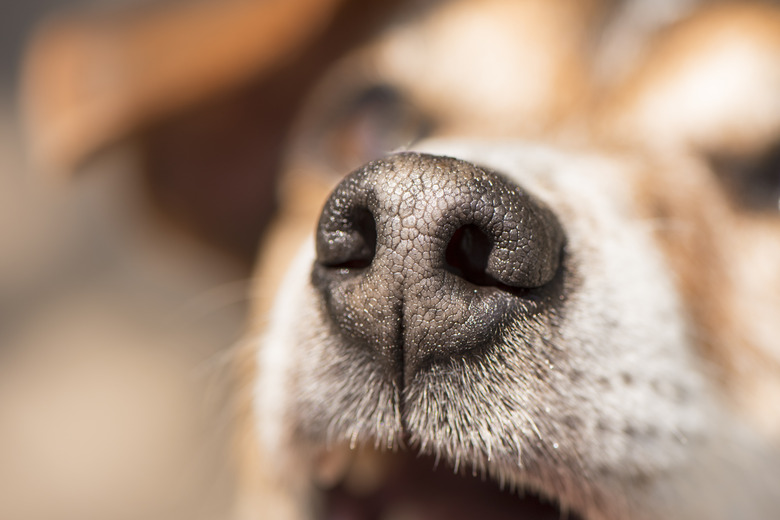How To Clear A Dog's Stuffy Nose
We may receive a commission on purchases made from links.
Disclosure: At Cuteness, we are committed to being the go-to resource for pet owners and animal lovers. We only recommend products we think our audience will love. If you purchase something by clicking on one of these links, we may receive a small commission of the sale and the retailer might receive some data for accounting purposes.
No one likes having a stuffy nose, even your dog. It's unpleasant for him to have his breathing restricted and any type of stuffiness has a variety of medical causes, ranging from simple to more complex. If your dog experiences a stuffy nose for more than one day, take him to the veterinarian for an examination.
In dogs, stuffy noses can result from things like allergies, bacterial or fungal infections, viruses, tooth abscesses, parasites, and nasal polyps. These are serious conditions that require the expertise of a vet to treat.
In the meantime, there are ways to clear a dog's nose and offer immediate relief prior to a veterinary visit. This way, your pup will be more comfortable while he awaits treatment and some of these techniques may also be used in conjunction with his eventual veterinary treatment, as well. Be sure to always check with your vet, though, to ensure that all medications you give are safe for your dog.
Dog stuffy nose symptoms
Dog stuffy nose symptoms
You're familiar with the obvious signs of a stuffy nose, such as difficult, noisy breathing. Dogs might suffer from nasal congestion without the telltale sniffing and snorting. Other signs of a canine stuffy nose include face pawing and sneezing.
If your dog is breathing through his mouth but not panting, it's likely his nose is stuffed up. Normally, dogs breathe through their noses except when it's hot or they've finished exercising. They then pant as a cooling mechanism. You may also notice a visible nasal discharge coming out of the nose.
Steam or humidifiers
Steam or humidifiers
One nonmedical and safe way to obtain relief for your dog's stuffy nose is to put him in a room with a humidifier. The increase in air moisture provided by the humidifier helps open nasal passages. This goes a long way to helping him breathe better and can be continued with other medications for conditions like infections with no ill effects.
As an alternative, if you don't have a humidifier handy, find another way to offer him steamy relief. When you take your shower, bring your dog into the bathroom with you. The steam from the shower has the same effect as the humidifier.
If dog nasal congestion is something you encounter regularly, buy a humidifier you can keep in your home. Vicks Warm Mist Humidifier, Small to Medium Rooms, 1 Gallon Tank is compact enough to set up next to your dog's crate or sleeping area and is Amazon's Choice for humidifiers with more than 6,500 five-star ratings. If you prefer a cool mist, Pure Enrichment MistAire Ultrasonic Cool Mist Humidifier is an Amazon Best Seller with more than 30,000 five-star ratings.
Nasal decongestants and saline drops
Nasal decongestants and saline drops
You might have a human nasal decongestant in your medicine cabinet, but clear its use with your veterinarian before squirting it into your dog's nose. Using human decongestants such as oxymetazoline — marketed under the brand name Afrin — can cause potentially dangerous side effects in dogs, according to Merck Veterinary Manual. Your dog could experience vomiting and diarrhea, shaking and nervousness, or cardiac and blood pressure issues that could result in his collapse.
A better option is to use saline nasal drops or saline nasal spray in your dog's nose to clear his nasal passages, recommends Vetinfo. Your vet can advise you on the amount of saline spray to give to your dog. Saline nasal sprays can usually be found in pharmacies or your vet can tell you how to mix one up if necessary.
Benadryl for dogs
Benadryl for dogs
If your dog's stuffy nose is allergy-related, the over-the-counter medication Benadryl might help, according to petMD. Again, consult your veterinarian before giving your dog this drug, and ask for dosing information. An antihistamine, Benadryl works by counteracting histamines released by your dog's body as part of his allergic reaction to a substance, such as certain molds and pollens. Side effects of Benadryl include lethargy, decreased urination, and appetite loss.
Don't give Benadryl to dogs suffering from heart disease, hyperthyroidism, or bladder problems.
Decongestants just for dogs
Decongestants just for dogs
Order decongestant drops designed to be pet-safe on Amazon. SafeBay Breathe Well Dog Supplement are easy-to-administer drops containing elderberry, mullein, marshmallow root, and other anti-inflammatory herbs to help soothe your dog's respiratory passages. Prefer a pill you can stick in a piece of cheese or soft treat? BestLife4Pets Breathe Easy Respiratory Support for Dogs are odorless softgels delivering all-natural multi-symptom relief for stuffiness, allergies, colds and more.
Always check with your veterinarian before changing your pet's diet, medication, or physical activity routines. This information is not a substitute for a vet's opinion.
References
- PetMD: Nose and Sinus Inflammation in Dogs
- WebMD: Nasal Discharge, Sneezing and Nosebleeds in Dogs
- Pet Place: Oxymetazoline (Afrin®)
- Merck Veterinary Manual: Rhinitis and Sinusitis in Small Animals
- PetMD: Benadryl
- Stuebner Airline Veterinary Hospital: Canine Influenza
- Vetinfo: Saline Nasal Spray for Dogs
- Merck Veterinary Manual: Decongestants (Toxicity)
